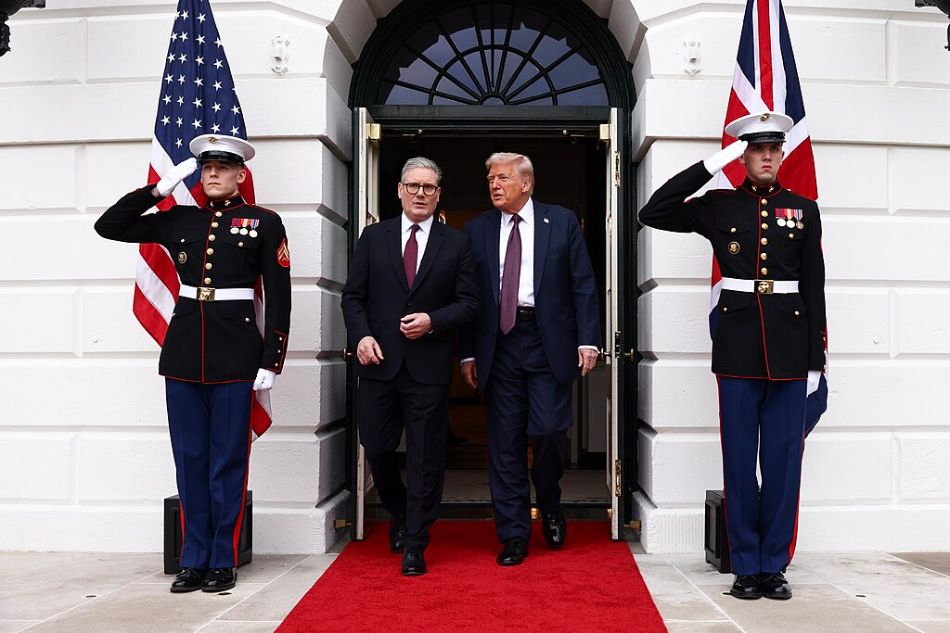Since Donald Trump’s return to the White House, the UK has found itself navigating a visibly fractured transatlantic alliance. Although the temperature of geopolitics may be increasingly concerning as the US and EU move in seemingly opposite directions on trade and security, the underlying power dynamic remains familiar to Britain’s policymakers. Over the last century, the UK has grown used to navigating these more powerful regional actors and its grand strategy as a middle power has been to avoid total dependence on either the EU or the US.
As an island nation-state, the UK has always been economically dependent on proximal European trade, even as the US has much greater sway over the UK in terms of defence and security. However, in recent years, the UK’s own strategic positioning has evolved from a post-Brexit Global Britain to an agenda tying defence and economic security together, in recognition of geopolitical realities.
Now, as Trump attempts to refashion the politics of global trade, the UK’s desire for an economic agreement with Artificial Intelligence (AI) at its heart aims to give greater substance to its ambitious rhetoric. Building on earlier efforts, the UK hopes it can partner with the US not just to integrate AI into its defensive alliance, but to create an AI geostrategic core, not dissimilar to the dominance of Anglo-American financial capital, focused on the flow and financialisation of data.
The lure of securing such a deal would satisfy a long-craved prize in the post-Brexit landscape. At the same time, the UK government may find itself moving closer towards an economic arrangement on AI that could compromise its regulatory independence on market risks, consumer safety, and competition. In the longer term, therefore, drawing closer to the United States on AI development will have implications not just for defence and security, but for the UK’s political economy and liberal democracy.
This month, Peter Kyle, the UK’s Secretary of State for Science, Innovation and Technology, travelled to San Jose, California, to deliver a speech at Nvidia’s AI developers conference. Kyle set out the UK’s intention to expand its development of AI technologies to fuel economic growth and recovery in post-industrial and deprived areas, while providing the basis for closer economic and security ties with the United States.
The terms of a US-UK economic deal are yet to be fully revealed, but an agreement will have economic and not just foreign policy implications, including the potential to increase the UK’s competitiveness and influence over AI development at the expense of the EU. Despite the Trumpian flavour to the talks, there is much policy continuity, as the UK has long hoped to persuade the US that a formal AI agreement with the UK will aid the US in beating China in the technology arms race. Under the Biden administration, the then Prime Minister Rishi Sunak signed the Atlantic Declaration, billed as a “21st-Century US-UK Economic Partnership”, facilitating economic initiatives to provide mutual benefit from the growth and disruption of AI while combating China’s threat to joint security interests. This strategic agreement was reached as a consolation for the UK, after the Biden administration declined to pursue a free trade agreement.
The power imbalance at the heart of the special relationship has been firmly on display this month, with the UK unable to negotiate an exemption from the imposition of Trump’s global tariff regime, despite intensive efforts on the British side. The UK’s failure to secure an exemption will reinforce a pressing dilemma for the British government. How can it negotiate favourable terms while pushing back against an ideological agenda at odds with its commitment to liberal internationalism?
The current approach of the United States is to seek a maximalist strategy on trade, where threats to impose punitive measures are meant to elicit concessions. Although the UK denies that free speech has been a subject of negotiations, the US has sought to see any bilateral agreement, including a removal or reduction of its digital services tax and online safety protections. This comes after the US’s mounting criticism of attacks on free speech by European and British governments, something historically reserved for authoritarian regimes.
However, under Trump, the UK is in a much more favourable position than it found itself during the Biden Presidency. In the eyes of UK policymakers, the size and depth of its AI industry (ranked third in the world behind the US and China) make it ripe for collaboration with the US. From Britain’s standpoint, it badly needs foreign investment to build the necessary computing power for development in AI across the public and private sectors. The US is the obvious place from which such capital would emanate. Silicon Valley has provided significant investment in the UK’s so-called golden triangle, including its leading AI startups.
Whereas the UK had previously sought to lead the world on AI regulatory safety, Keir Starmer has signalled an intent to follow Trump in downplaying this aspect to prioritize adoption and implementation. This strategic positioning was on display in February 2025, when the UK followed the US in declining to sign a global agreement to promote AI safety and inclusion principles.
Under Biden, there was strategic interest in global cooperation on AI governance. In truth, however, divergence between the EU and the US on AI began well before Trump’s return to the White House. The EU’s approach to AI regulation has been solidly focused on supporting ‘ethical’ AI and human rights protection while also balancing the need for interoperability with US big tech firms. The UK has opted to pursue a middle path between the US and the EU on tech regulation, not just in AI but in fintech and crypto. Hoping to spur growth in the sector, the UK’s approach will develop industry-specific frameworks, governed by common principles, to find an optimum balance between risk mitigation, the protection of the public good, and economic growth and global competitiveness.
The Trump administration not only prioritizes innovation, it believes the threat from AI does not arise from market actors but from the regulatory state. This is obviously influenced by the administration’s closeness to big tech. Whether the correct analogy of the US geoeconomics is AI nationalism or mercantilism, the move towards de-regulation is being done in concert with huge federal and private sector investment in the US AI infrastructure.
By adopting the US conceptual framework of AI development as akin to last century’s nuclear arms race, the UK is signalling it recognises (given the threat posed to democracies by China’s future AI dominance) the primacy of securing protection under the US security umbrella. Kyle’s speech to Silicon Valley shows the UK government agrees that AI is ultimately a zero-sum game based on first-mover advantage. Britain may see its best strategy for success as a low regulatory threshold for innovation, supporting adoption at scale, as US tech firms provide the capital to stimulate AI industries. Drawing closer to the US could, in the long term, help the UK to take advantage of a reduced role for the EU in global supply chains.
However, in terms of the UK as an AI competition state, all this will come with significant trade-offs. One of these will be the difficulty of ensuring it can foster its own domestic AI industry without being captured by US big tech. The precedents for the UK retaining domestic ownership of innovative and market-leading AI companies are not promising. Regulatory and market capture is not inevitable. But the UK will need to show strong leadership and acumen to avoid such negative outcomes in any agreement. In terms of liberal democracy, the monetisation of public sector data may allow for significant investment and increased productivity in health services, but it will carry risks for privacy and freedoms. Free speech will also likely remain a tool the Trump administration uses to extract concessions for its own regulatory and tariff agenda. As anti-American sentiment rises across Europe, including the UK, Starmer’s government may face a strong public backlash if the agreement is too favourable to the White House’s agenda.
This also raises the question of whether the UK can play both sides. The Anglo-American core in the global financial system may be a replicable model in a US-UK geoeconomic AI partnership. However, it is inaccurate to frame the flow of capital in the Atlantic world as US-UK-centric. If the UK were to substantially diverge from the European Union’s approach to data protection, it would create real difficulties in terms of digital trade with its biggest export market.
As a problem, this will only deepen should the EU effectively uncouple itself from the US tech industry, building its own infrastructure and systems, and perhaps even drawing closer to China, to secure itself from a risky US path dependency. So far, there is a lack of evidence that the UK’s desire to catch up on AI is being accompanied by strategic thinking on the economic and security trade-offs involved in moving ever closer to the United States.
[Photo by Number 10, OGL 3, via Wikimedia Commons]
The views and opinions expressed in this article are those of the author.

George Gallwey is a global affairs analyst with expertise in geopolitical intelligence, political economy, and public policy. He has degrees from Oxford and Cambridge and a PhD from Harvard University. He spent 2022-2024 as a Senior Analyst at the Bank of England working on global digital assets regulation.

